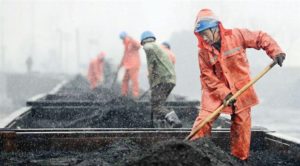Kategori : ELECTRICITY ENERGY NEWS, ENERGY AGENDA NEWS, COAL NEWS - Tarih : 13 June 2019
The reigning narrative of impending global environmental catastrophe dominates the airwaves and print media. Short of a drastic reduction in the use of fossil fuels, it is asserted, we are fast approaching the “end of days”. The demonization of fossils fuels in general, and coal in particular, has been wrought under pressure from special interests groups and organized lobbies of the climate-industrial complex where aspects of economic reality are caricatured or presented out of context. Complex trade-offs in energy policy are spun into tales of spurious simplicity, leading to misleading conclusions. Nowhere is this more apparent than in the debate over the role of coal-fueled power generation in Asia.
 Opposition to the building of coal power plants in the poorer countries has been justified by environmental activists, banks and multilateral development agencies such as the World Bank in two key ways. The first revolves around the claim that climate change mitigation programs carry “co-benefits” for public health in developing countries. The second utilizes the assertion that renewable energy such as solar and wind power are effective substitutes for centralized grid electricity generated by fossil fuels.
Opposition to the building of coal power plants in the poorer countries has been justified by environmental activists, banks and multilateral development agencies such as the World Bank in two key ways. The first revolves around the claim that climate change mitigation programs carry “co-benefits” for public health in developing countries. The second utilizes the assertion that renewable energy such as solar and wind power are effective substitutes for centralized grid electricity generated by fossil fuels.
Climate change policy does not help the poor
The claim that aggressive climate change mitigation programs helps the poor is egregiously misleading. Modern coal plants are a success story, as pollutants emitted have fallen dramatically with technological improvements over the past several decades. Key pollutants that adversely affect human health include carbon monoxide, lead, sulfur dioxide (SO2), oxides of nitrogen (NOX), ground level ozone and particulate matter (PM). A new pulverized coal plant, with flue gas scrubbers, fabric filters, catalytic reduction and other control equipment and processes, reduces NOX by 83%, SO2 by 98% and PM by 99.8% compared to a similar plant without such pollution control features, according to the US Department of Energy.
Ambient air pollution in both urban and rural areas in developing countries is a real problem, but it is primarily due to the indoor burning of solid biomass in cooking and heating. The use of charcoal, wood, dung and crop residues within households is caused by the lack of access to grid electricity and modern fuels such as LPG. The World Health Organisation reports that close to 4 million people die prematurely from illness attributable to indoor air pollution each year. The real solution, as apparent in the experience of the now developed countries, is to remove the need for using traditional biomass by providing affordable electricity and cleaner fuels. Coal power plants also lay the basis for improved public health with adequate clean water supply and refrigeration for food supply chains and the storage of vaccines in hospitals.





